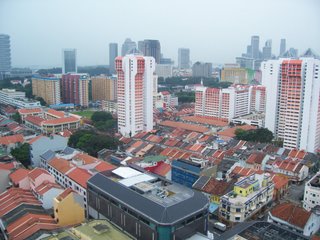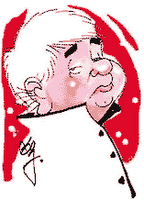 (The view from my hotel room)
(The view from my hotel room)I am taking a brief hiatus from my general blogging to venture into personal terrain, during my brief stay in Singapore. To be honest, I am not very keen on spending money and travelling abroad but if your employer wants to show you the world, can you say no? And so here I am jotting down my thoughts in the tiny island of Singapore- lost and confused as usual.
I reach the shores of Singapore, after a few weeks of visa related delays, at about 6:30 (4 AM IST) in the morning, with about 4 hours of sleep in Singapore Airlines. The Airlines is quite comfortable and I am escorted across without too many security checks, unlike how I had imagined it would be. I step out hesitatingly out of the plane(my confidence is always at a premium in a new environment)and bump into an old acquaintance who clearly knows the place and guides me across to the foreign exchange counter and subsequently to the taxi stand.
The taxi driver is a jolly man and gives me his visiting card, in case I wish to go for city darshan (I did not have a visiting card myself, how offending!!!). Anyway, he drops me off at New Park Hotel which is at a place called Little India. After a few hours of rest, I am summoned to office to meet my boss for the first time. And in the evening, I’m back to the hotel in the local train (they it call it MRT here). I stay next to a mall kind of place called Mustafa which has everything under the sun available.
I am glad to find that the place is inundated with Indians, especially from the south. My food is happily taken care of and I hear Tamil words wafting across the place. The Mallu in me, however, searches for a Kerala connection but I do not find any. Is the stereotyped Nair chai kada (tea stall) or thattu kada (roadside stall) just a figment of someone’s fertile imagination?
Singapore is full of streets and alleys. Every road/ street I see carries a name -something very important for us to learn; I often why India does not have proper signboards and notices everywhere rather than leaving us to the mercy of the public. Nevertheless, I lose track of my hotel briefly before relocating it after some local help (speaks volumes about my sense of direction, I guess).
The transportation scene is good with trains being the main system in this small country. The local train travel is pretty comfortable and I am at ease on the first day itself. It is similar to Mumbai with three different tracks operating through the city but there ends the similarity. The train has automatic doors; is well lit and is an indoor travel for most of the journey. The arrival of the stations is announced and displayed both in English and Tamil. If only Mumbai tried to emulate a few of these things…..But Delhites have told me that the MRT there is equally good.I assume it is but I cannot vouch for it...
Taxis are prevalent but difficult to get after about 8 pm, except of course if you call their service and book a taxi. The taxis are fairly hi-tech in the sense that they accept cards, provide bills and are connected to the local network through an interactive device always. A couple of nights back, I am given a small treatise on the call girls industry in Singapore by a friendly cab driver who wonders why India does not legalize this profession as in Singapore or Thailand.
I also learn that call girls here carry yellow employment passes and that this industry contributes about 2% of the GDP in Thailand. Wow, maybe they should think about starting a few SEZs- Special Entertainment Zones- then ? That's the in thing; ask Kamal Nath.I do not endorse the cabbie’s views but decide not to argue in an alien country and smile approvingly.
I am surprised that the office has no canteen here but looks like that’s the norm here. Everyone eats outside and I wonder if the concept of a cooking housewife is a misnomer here. With lots of hotels and joints spread across, we are spared of this chore as bachelors. I do not come across any animals here except in hotels. Maybe, no one’s ever told them that there are even other creatures on this planet. Thank God, the Holy Cow is still safe in India…
Of course, the work is no great shakes except that we are in a foreign country but then are we not living our dream of working outside India?(The quintessential Andhraite’s perennial dream). I refuse to divulge further details on innocuous things like job profile and work but if someone were to ask me about my job, I would say check the monster.com ad – Caught in the wrong job???
But where’s the poverty of Singapore? Are there no poor people here? I do not know but then this world is so different from the world I know and have seen sometimes. Once a while as I enjoy this luxurious life, I ask myself is the world between the haves and the have-notes unbridgeable? Being the pseudo-socialist that I am, whose exposure to poverty is limited to Sainath’s articles, I soon forget this troubled question and become a part of the conformist elite that lives on, ignoring how the other half lives…
Anyway, it’s a week down and three more to go before I’m back in MY COUNTRY…
